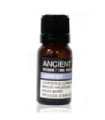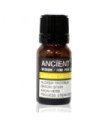Scientific Name: Citrus Aurantium
Plant Part Used: Flower
Origin: Tunisia
Method of Extraction: Steam Distillation
5% Dilution in Grapeseed Oil
Derived from the blossoms of the bitter orange tree (Citrus aurantium var. amara), also called Neroli bigarade, Neroli oil has a scent akin to bergamot. Handpicked blossoms undergo water distillation, a method preferred due to the delicate nature of the flowers. This essential oil is highly sought-after for both its pleasing aroma and therapeutic qualities.
Neroli Essential Oil is said to be an excellent calming agent, alleviating chronic anxiety, depression, fear, shock, and stress. It is also thought to ease intestinal spasms, colitis, and diarrhea. Because of its sedative effect, it is beneficial for those suffering from insomnia, heart palpitations, neuralgia, and vertigo. Heating it in an oil burner in a patient's room is recommended. Neroli oil is also believed to promote skin cell regeneration and prevent scar tissue, providing smoother skin, reducing stretch marks, and healing broken capillaries.
The use of Neroli oil dates back to the Romans. In 1680, it was popularized by Anna Maria Orsini, the princess of Nerola, who used the oil to scent her gloves and bath, leading to the name 'Neroli'. Folklore suggests that orange blossoms were used to adorn newlywed's beds to induce relaxation. The oil is costly due to the careful extraction process, which involves plucking the blossoms at the peak of their bloom.






